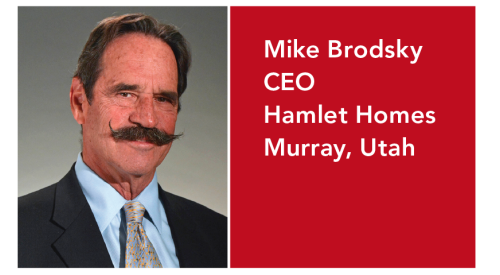Rick Beckwitt, 40, should be the poster boy for a housing industry ad campaign touting unlimited career opportunities. He started in the building business as a framer while still an Englewood, Colo., high school student. He’s now president of a $3.1 billion-a-year home building behemoth and arguably the person most responsible for D.R. Horton’s mind-boggling growth in the 1990s.
| Rick Beckwitt |
More responsible than D.R. himself or Don Tomnitz? Perhaps. At least in one sense, it’s certainly true: Beckwitt is the designated acquisitor, the guy who finds companies to acquire and puts together the deals. And acquisition is the modus operandi of Horton’s growth.
Among more than a dozen acquisitions since 1994, two deals stand out: In February 1997, Beckwitt landed The Torrey Group, Atlanta’s largest builder, with satellite operations in Charlotte and Raleigh, N.C., and Greenville, S.C. Torrey generated $200 million in 1996 on sales of 1,442 homes. And in April 1998, publicly traded Continental Homes, headquartered in Phoenix, with operations in San Diego, Denver, Miami, Dallas, San Antonio and Austin, Texas, merged into D.R. Horton Inc. Continental had $681.8 million in 1997 revenue from 4,904 sales.
It’s hard to imagine that Beckwitt saw this coming when he graduated with honors from tiny Claremont McKenna College in California in 1981 with a B.A. in economics and psychology. For five years after graduation he was a custom home builder and remodeler, first in Denver and then in Maine.
"I fell in love with a girl from Maine," he says now, recalling the influence of his wife, Barb, on the course of their lives. "In 1986, she introduced me to some people who worked for Lehman Brothers. They needed people with specialized knowledge of the building industry and said they could teach me investment banking."
Beckwitt went to work in the Wall Street giant’s corporate finance department, specializing in building products, construction materials companies and home builders. Then he moved to mergers and acquisitions. It was there he met Don Horton in 1991, as D.R. began the initial public offering process that culminated in the June 1992 Horton IPO. "After that, Don wanted to grow the company, and he said, ‘Why don’t you come back to something you really love?’"
They negotiated for seven months, during which each unquestionably learned a lot about the negotiating skills of the other. D.R.’s edge might have been that Beckwitt had a young family he was eager to see more.
"The decision really came down to my wanting to have an impact on one company rather than being involved with many as an investment banker," Beckwitt explains. "Don had a vision. And he needed help attracting the investment research community, increasing research coverage of his stock. I knew all the analysts and a lot of institutional investors."
Eventually, Horton convinced Beckwitt to lead his charge toward growth by acquisition of leading builders in new markets. Beckwitt came aboard in March 1993 as executive vice president. He was elected to the board of directors in July that year. He became president of Horton’s investments and acquisitions division in July 1996 after spending half the year as manager of the company’s eastern region. He was elected president of D.R. Horton in November 1998.
"It’s been good for my family," says Beckwitt. "I don’t work any less, probably more, but I have more control over my time. I get to coach my kids’ soccer teams (son Jack is 8, daughter Cassidy is 7). My wife is a lawyer, but she’s not practicing. We think it’s important for the kids to have their mom at home."
Of his relationship with D.R. and Don Tomnitz, Beckwitt says, "It’s a very calm environment. We check our egos at the door, and we all work together to figure how to make each other more effective. There’s no overlap. We each have our specialties, and we get together once or twice each week to stay in tune with what the others are doing. It’s great."
Beckwitt doesn’t keep the same early-bird hours as D.R. and Tomnitz, but he’s often the last to leave at night. "When I first started here, the phone rang in the darkness every morning, and it would be Horton," Beckwitt says with a laugh. "Soon, the phone moved to my side of the bed.
"Now those calls don’t come as often. We all know how each guy thinks. I like to spend time in the morning with my kids, especially since I’m often not back until late and I’m on the road so much."
Especially when an acquisition is at hand or in due diligence, Beckwitt is there. "I have a tendency to ‘mother hen’ every deal. I meet the principals at the front end, negotiate terms and build rapport. I get the team comfortable with what life is going to be like as part of Horton. I ensure the company is a good fit for us. During transition, I handle all the integration until operational responsibility passes to Tomnitz."
(Before turning over Continental, Beckwitt actually relocated to Phoenix for three months, commuting home to Dallas on weekends.)
What’s his personal future?
"I love what I’m doing now, the challenge of growing this company. It’s really the perfect job for me because I get to blend all the things I’ve done in my life, from framing carpentry to dealing with Wall Street. And I love negotiating deals. I’m a deal junkie.
"I want to see the company grow now in different directions, widen the cast of our net and go into different business lines," says Beckwitt.
The conglomerate looms.
Also See:
D.R. Horton Inc. The Aggressive Acquisitor
D.R. Defines Strategic Vision
Tomnitz Is Mr. Manager
Flat-Out Entrepreneurial











